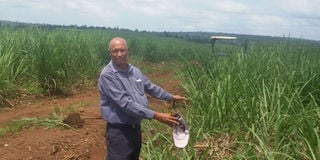Byensi earns Shs4bn from Sugarcanes

David Byensi has no regrets quitting his white collar job. Photo by Denis Bbosa
What you need to know:
- David Byensi a former human resource manager at Kinyara Sugar Works Limited quit his job to join the murky waters of farming.
- From scratches, Byensi has seen his farm grow by leaps and bounds and today it is the biggest supplier of canes to Kinyara Sugar Works Limited, writes Denis Bbosa.
It takes more than courage and desire to quit the comfort of a well-paying office job and venture into the risky and demanding sugarcane growing business – and on a large scale.
Sixty six-year-old David Byensi of Bunjenje-Masindi did just that in 2010, swapping the air-conditioned Human Resource Office at Kinyara Sugar Works Limited for the plantation activity - and he proudly states it plainly that he has no regrets after hitting gold.
Byensi, who started part time sugarcane farming in 1996, now owns 640 acres of sugarcane valued at Shs4bn and over 100 acres of pine trees. “I started with 36 acres of sugarcane while I was still the head of human resource department at Kinyara where I worked for 16 years. I realised I needed to retire and concentrate on growing sugarcanes since I had invested all my savings in buying land,” says Byensi.
He credits wife Maggie, as one of the fundamental pillars of their business success story.
He has greatly benefitted from having been born near a sugar plantation. His first plantation (180 acres) was started at Sonko River Estate and it borders Kinyara’s 20,000-acre sugarcane plantation. The other 450-acre plantation is in Rusangura-Kitamba parish.
He has another 32 sugarcane acres in Kisambo and another 40 acres in Kinywamurara.
“With the help of technology platforms I’m able to manage my project but I have recruited managers who give me periodic reports,” Byensi reveals.
His human resource background has also played a pivotal role in the success of his blossoming franchise. “As a specialist in human resource management, I ensure that the workers’ welfare is sound so that I am able to retain them for long. They work under no supervision and know that at the end of the day the business benefits us all,” he argues.
Riding on mechanised farming
Byensi’s sugarcane business began taking giant strides three years ago when he embraced the use of tractors instead of the slow operating human beings. He bought his first New Holland tractor at Cooper Motor corporation three years ago at $30,000 (Shs108m), added two more tractors a year later at $26000 (Shs93m) and two more last year at the same cost. With work becoming easier, Byensi expects three more tractors in December at $24000 (Shs86m) to be paid in batches, to make eight on his farm.
“Mechanised farming helps in reducing labour expenses. Human beings can be slow in that where a tractor takes two hours to work on 10 acres they can take two weeks,” Byensi acknowledges. For the good innovator he is, Byensi has started a private wielding unit at his six-acre home in Bunjenje with a full time chief welder and mechanic to fabricate utilities on the tractors like disc plough, harrower, inter row cultivator, furrower and gang mower.
“With the five tractors, I earn from haulage (transporting sugarcane) and serving Kinyara with high quality sugarcanes.”
He stresses that tractors always improve on quality of the produce adding that an inter row cultivator raises the soil for proper watering unlike a hand hoe that stops on the surface.
What makes him tick?
Byensi is patient and consults widely before venturing into a business project. He says he is slow to diversify but when he looked at how ‘recklessly’ people were cutting down trees, he knew planting pine for timber would be the remedy as deforestation sets in.
He also has 100 acres of pine in Rusangura, 17 more acres of pine at his home and 10 acres of eucalyptus and Bulgaria trees at Mahabo – all worth Shs1.7bn. Byensi has benefited greatly from being on the board of Masindi Sugarcane Growers Association for it enables him bargain for fair prices and exchange farming notes with other extensive outgrowers.
Advice to prospective farmers
He offers tips on what it takes a prospective sugarcane farmer to pull it off like him – and emphasises it is a venture everyone can pursue.
“There is available market for sugarcane and instant yields as long as one maintains the plantation well. It is a longtime crop that takes 18 months to mature but requires extra maintenance first six months. Sugarcanes are greedy plants that eat all the nutrients so it is advisable you intercrop with leguminous crops such as beans and ground nuts to act as fertilisers,” he advises. Usually less shrewd farmers harvest twice from the sugarcane plantations before planting again but Byensi harvests over five times – thanks to his high maintenance habits.




